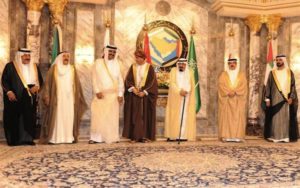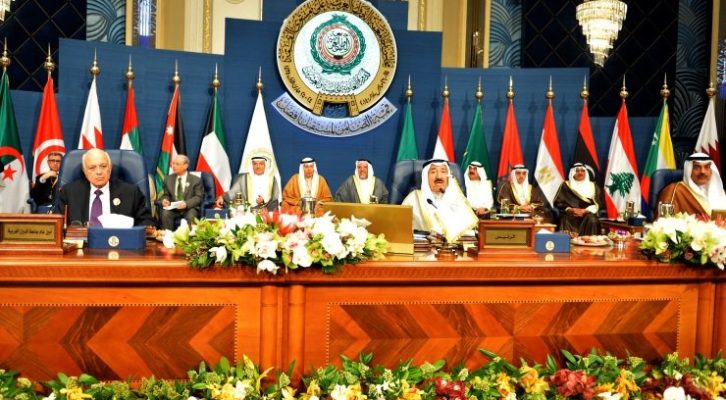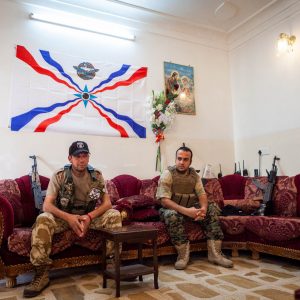“He who causes another to become more powerful ruins himself” The Prince, Machiavelli
The unrealistic and miscalculated strategic mistakes that some Gulf monarchs committed from 2003 till now are one of the main factors that lead to the fragmentation of some Arab countries and the weakening of their armies. This catastrophe paved the way towards political vacuum which was filled by radical Islamists militant organizations.
The strategic mistakes that the Gulf especially Saudi Arabia did in 2003 by ousting Saddam Hussein and supporting in the destruction of his army brought to the Arab World the current catastrophe. Unfortunately, similar mistakes are being continued, the latest developments in Syria, Iraq and Gaza reflects the strategic mistakes of Saudi Arabia and other Gulf countries.

Gulf leaders gathered in Riyadh with their host Saudi King Abdullah ibn Abdul Aziz on May 14, 2012
Many would ask how the Arab World reached to this catastrophic stage. With the destruction of Iraqi army, one of the strongest Arab armies in the region, and the ousting of Saddam Hussein, Iraq became already fragmented and militias ruled the country. From 2006-2007, for the first time in an Arab country, a sectarian violence broke out between Sunnis and Shias, already this was the sign of end of secular pan-Arabism. Iraq was turned into a sectarian slaughter house; similar to the Lebanese civil war (1975-1990) people were being killed because of their sectarian, ethnic or religious identity. The fragmentation of Iraq and the weakness of its army encouraged transnational Jihadists such as al Qaida to infiltrate the country and in 2006 the Islamic State of Iraq was founded.
If Italian philosopher Niccolo Machiavelli was the “Prince” of Saudi Arabia, would he support the overthrow of Saddam? Definitely not! After the 1979 Iranian Revolution, the Iranian regime started to export its revolutionary religious ideas to Iraq and the Gulf. The Sunni monarchs alarmed, encouraged their rival, the Baathist regime of Iraq to launch an offensive attack on Iran. Iraq, though could not achieve its military goals on Iran but with its army kept the military and political balance in the Gulf. With the overthrow of Saddam, in 2003, Iraq was essentially neutralized, its 30 million people were fighting each other rather than counter balancing anyone, Iran for the first time in centuries was free of any significant external threat from its neighbors. Meanwhile, Gulf monarchies, Egypt and Turkey could not fill the “Sunni vacuum” due to the clash of interests they had. Thus, the balance of power in the region shifted towards Iran as Shias came to power in Iraq via elections and Hezbollah won over Israel in 2006 and had a veto power in the Lebanese government after the 2008 clashes in Beirut.
According to Machiavelli, a prince should avoid three things; extinguishing a weaker power, strengthening one that was already strong, and after defeating the rival or enemy failing to establish a colony. The Gulf and US failed in these three tasks, they destroyed Iraq’s military power, indirectly changed the regional balance of power in favor of Iran and failed to install an ally government in Iraq.
Moreover, with the outbreak of the “Arab Spring”, the Gulf Monarchs and their Western allies started to redraw the political map of the Arab World. Syria was one of the strongholds of Iranian influence in the region. That is with the overthrow of Bashar Assad’s regime and the installing of a Sunni pro-western regime, Hezbollah’s route of supply will be cut and the later will be geographically isolated from Iran. Qatar and Saudi Arabia didn’t take into consideration the demographic structure of Syria, a multicultural and multi-ethnic country, where any shift in the domestic balance may reflect on the region just like Iraq. Moreover, the leader of Hezbollah, Sayyid Hassan Nasrallah justified his party’s military intervention in Syria, on behalf of the regime, that both are fighting against the “Takfiris” and “Zionists”. Nasrallah knew that with the overthrow of Assad, his party’s political influence in Lebanon would weaken. Furthermore, with the influx of Gulf cash to the Syrian Islamist rebels and the authoritarian policies of the Syrian regime, the revolution radicalized and al Qaida had the upper hand whether through Jubhat al Nusra or ISIS, both groups filled the power vacuum in the regions where the Syrian army lost control.
As it was clear to the Saudis and Qataris that the West would not push for military intervention to topple Assad, both kingdoms tried to reorganize their allies on the ground and back local armed Islamist groups. Thus instead of unifying their efforts to oust the Syrian regime, the clash of interests between the Saudis and Qataris weakened the rebels on the ground. Furthermore, it was not surprising that the “Sunni” rebellion in Iraq was welcomed by the Gulf states, their main concern was just to get rid of Maliki even with the cost of fragmenting already fragmented Iraq (One third of Iraq got occupied by ISIS, the army in Mosul vanished and Kurdistan became a semi-independent state). Moreover, the departure of Iraqi PM Nouri al Maliki, which was seen a victory for the Saudis, could not be translated on the ground, the Sunni factions still have boycotted the newly formed Iraqi government, and the state is unable to liberate the country from ISIS forces.
Finally, the latest crisis in Gaza should not come as a surprise to some of us. Some analysts would argue that the war on Hamas is continuation of Saudi Arabia’s war on the Muslim Brotherhood. After the overthrow of Egyptian President Morsi, Saudi Arabia wanted to isolate Hamas, who backed Morsi, and also marginalize Qatar’s role in the region. The real question an observer should ask is what the alternative is in case Hamas is weakened; already there are some reports that al Qaida is being infiltrated in Gaza.
The latest catastrophic developments in the region tell us how the Arab leaders took unrealistic, uncalculated and non-visional steps, and instead of supporting each other, they tried to destroy each other’s armies. Terror organizations such as ISIS benefited from this weakness and power vacuum. Furthermore, the strategic mistakes of some Arab leaders with the end of state sponsored pan-Arabism helped Iran, Turkey and Israel to have the upper hand in the region and interfere in the domestic affairs of the Arabs. In order to overcome on this Arab crisis and save their countries from fragmentation, Arabs need the political, military and diplomatic advices of Machiavelli and avoid similar mistakes as it happened in 2003. The rise of the radical transnational Jihadism such as ISIS in the heart of the Arab World should alarm the Arab leaders to come close and fight together against the terror, instead of destabilizing each other. The enemy of my enemy is not always my friend.
Yeghia Tashjian holds a B.A. in political science from Haigazian University in Beirut, Lebanon. He is a Lebanese-Armenian political activist, researcher, blogger and the founder of the New Eastern Politics forum/blog. Currently, he is the regional and communication officer of Women in War, a gender-based think tank and research assistant at the Armenian Diaspora Research Center-Haigazian University. You can follow the author on Twitter @yeghig.







